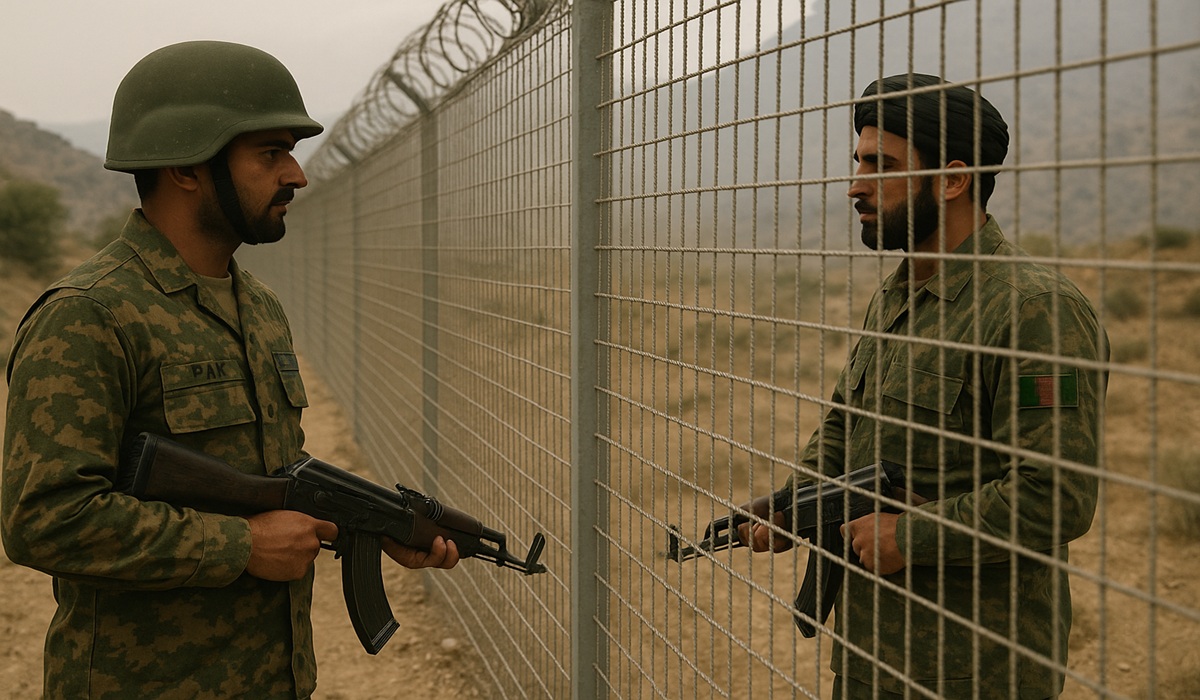Pakistan-Afghanistan Rising Conflict: A Brewing Storm and Its Regional Implications
- Bakhtawar Naveed
- Middle East
- Trending News
- October 31, 2025

The Pakistan-Afghanistan relationship, often described as a “brotherly bond,” has once again descended into tension and distrust. What once appeared as a partnership built on shared faith, culture, and geography has now turned into a battlefield of suspicion, border clashes, and competing regional interests. From skirmishes along the Durand Line to verbal spats between political leaders, the rising hostility between the two nations is fast becoming one of the gravest security concerns in South Asia. The possibility of an open conflict—though still distant—cannot be ignored, and its consequences would be catastrophic not only for Pakistan and Afghanistan but for the entire region.
At the heart of the growing friction lies the question of cross-border militancy. Pakistan accuses the Taliban regime in Kabul of providing safe havens to Tehrik-e-Taliban Pakistan (TTP) militants, who have carried out numerous attacks on Pakistani soil. Islamabad’s repeated demands for action against these groups have been met with defiance or silence. The Afghan Taliban, in turn, accuse Pakistan of unfairly blaming them for its internal security issues and of bowing to Western pressure.
The border issue—rooted in the long-contested Durand Line—has also resurfaced as a flashpoint. Afghanistan has never formally recognized the Durand Line as an international boundary, and the Taliban regime seems reluctant to challenge nationalist sentiment at home by accepting Pakistan’s position. This territorial ambiguity has given rise to frequent skirmishes, economic blockades, and mutual distrust.
If tensions escalate, Pakistan will face multifaceted damage—security, economic, and diplomatic. On the security front, an unstable western border will divert resources from its eastern frontier with India, weakening national defense preparedness. The rise in cross-border terrorism could destabilize Pakistan’s Khyber Pakhtunkhwa and Balochistan provinces, where militant sanctuaries are already expanding.
Economically, the trade corridors linking Pakistan to Central Asia through Afghanistan would be jeopardized. The region’s connectivity dreams, including the China-Pakistan Economic Corridor (CPEC) extensions into Central Asia, rely heavily on peace in Afghanistan. A breakdown in relations would not only halt trade but could also isolate Pakistan from lucrative regional energy projects like TAPI (Turkmenistan-Afghanistan-Pakistan-India pipeline).
Diplomatically, Pakistan would face renewed skepticism from global actors, particularly China and Russia, who view stability in Afghanistan as key to their strategic interests. A deteriorating relationship could undermine Pakistan’s role as a regional stabilizer and push Kabul further into rival spheres of influence.
Afghanistan, already economically fragile and diplomatically isolated, would suffer even more from prolonged hostility with Pakistan. Nearly 70 percent of Afghan trade passes through Pakistani ports, especially Karachi and Gwadar. Any closure of trade routes or escalation of border tensions would cripple Afghanistan’s economy, drive inflation, and increase public discontent with the Taliban’s rule.
Moreover, Pakistan remains a critical source of humanitarian and logistical support for Afghanistan. Millions of Afghan refugees continue to live in Pakistan, and any deterioration in relations could lead to their forced repatriation—further straining Kabul’s capacity to govern. Militarily, the Taliban regime lacks the strength, organization, and international recognition to sustain a conventional conflict with Pakistan. Any such confrontation would expose Afghanistan’s internal ethnic fissures and possibly ignite a new phase of civil strife.
The most significant beneficiary of a Pakistan-Afghanistan rift would be India. New Delhi has long sought to counter Pakistan’s strategic depth policy by cultivating ties with various Afghan factions, including those disillusioned with Islamabad. A fractured relationship between Pakistan and the Taliban regime would allow India to reassert its influence in Kabul—through economic aid, intelligence cooperation, and soft power diplomacy.
India could exploit the conflict to portray Pakistan as a regional destabilizer, strengthening its own global narrative and strategic alignment with the United States. Moreover, instability in Afghanistan would create a vacuum that India might fill through covert networks and intelligence operations against Pakistan, particularly via TTP and Baloch insurgent proxies.
For China and Iran, the implications are equally serious. Both states seek a stable Afghanistan for their regional connectivity and security interests. A Pakistan-Afghanistan conflict would jeopardize the Belt and Road Initiative and push extremist groups closer to their borders.
In this tense environment, Pakistan must avoid the temptation of direct confrontation and instead adopt a multi-pronged diplomatic approach. Islamabad’s engagement with Afghanistan’s non-Pashtun political blocs—particularly the Tajiks, Uzbeks, and the followers of the late Ahmad Shah Massoud—can become a decisive card in shaping Afghanistan’s future political structure.
Historically, these northern groups have opposed the Taliban’s monopoly on power. If Pakistan can establish trust-based relationships with them through political dialogue, humanitarian aid, and economic collaboration, it may regain leverage in Afghanistan’s evolving political scene. This approach, however, must be cautious; overt interference could backfire and unite Afghan factions against Pakistan.
At the same time, Pakistan should intensify regional diplomacy with China, Iran, Russia, and the Central Asian republics to build a collective security mechanism focused on counterterrorism and border management. A joint regional framework, possibly under the Shanghai Cooperation Organization (SCO), could provide both legitimacy and strength to Pakistan’s efforts.
The Pakistan-Afghanistan conflict, if not contained, risks plunging South Asia back into chaos. Both nations share not only borders but bloodlines, history, and faith. Their rivalry only benefits external actors—India most of all—while inflicting immeasurable damage on their own people.
For Pakistan, prudence and patience must guide policy. The focus should remain on securing borders, dismantling terrorist networks, and fostering regional alliances rather than pursuing short-term political victories. Afghanistan’s future, like Pakistan’s, depends on stability and mutual respect. A new Cold War in the region would serve no one—except those who seek to keep South Asia perpetually divided and weak.








